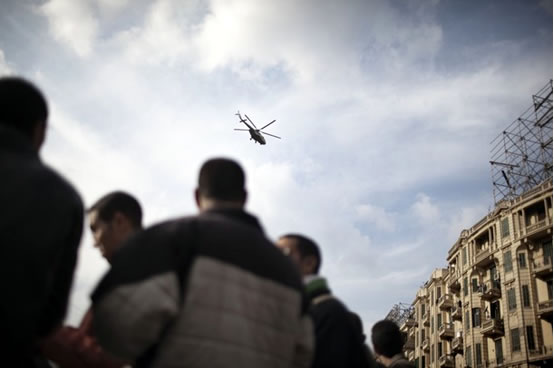
Military helicopter over Cairo: looking for enemy? Civilians? Muslim Brotherhood?
by Muuse Yuusuf
Sunday, January 30, 2011
Tanks roaming in the streets of Cairo after angry protesters defeated the much hated Egyptian police is a telling story. Inspired by their brethren Tunisians’ upraising now dubbed as the “Yasmin revolution”, ordinary Egyptians have reclaimed the Tahriir, the freedom square, one of Cairo’s many squares. They have expressed loud and clear of their revulsion and anger against an entrenched regime that has been oppressing them for a very long time. Thirty years, that is one third of a whole century. Their message is unequivocally clear: “Go away Mubarak, the pharaoh…we do not want to see your regime becoming a dynasty in which your son, Jamal, is being groomed as your heir”.
Overwhelmed by the scale of the demonstrations, President Hosni Mubarak made a televised speech to his people. However, rather than show humility and step down, the only thing he could offer was to sack his government only to replace it with another government headed by his henchmen, the same people who have been part of this entrenched dictatorship. This was an insult to injury and people got angrier, continuing with their protests, occupying and reclaiming streets as they destroyed symbols of the regime power, defacing Mubarak’s portraits. As a show of force and dangerously raising stakes highier, the regime flew fighter jets in Cairo’s blue sky as though Cairo became overnight an enemy territory full of military targets to be destroyed. Ironically, only civilians with placards are camping on the Tahrir square, demanding their president to go.
As a Somali who has lived in dictatorship, I could not help but to feel sorry for the Egyptian people. Also, I could not help but to invoke the power of hindsight as Hiiraan has eloquently done in its recent editorial.
It was in 1980s and the Somali people had enough of the President Siyad Barre’s regime, asking him to step down using arts and other means of expression especially poetry spearheaded by famous poets, such as the great poet, Hadrawi. Armed opposition groups spread like a bush fire. Rather than listen to people and show humility and go, the regime became even more entrenched and repressive as close relatives of the former President were given higher security and military posts. The boiling kettle reached one hundred degree in 1988 when the regime air-bombarded Hargeisa and Burao towns to dislodge the Somali National Movement (SNM) and its supporters. That was the first time a Somali government had ever used airpower against its own people, and indeed it was the darkest day in Somali history.
Again, I cannot help but to compare the deployment of military jet fighters and tanks across Cairo with the Somali regime’s action in 1988. Imagine, if those poor unarmed civilians in the Tahriir square were hypothetically heavily armed rebel groups just like the SNM determined to take on the regime? The situation in Cairo might well have been much gloomier and grimmer and thousands of dead bodies could have been scattered throughout the square exactly as Hargeisa was 22 years ago. This is what some governments, no matter how democratic, autocratic, weak or strong do when their authority is threatened. There are many examples in history where governments brutally suppressed insurgents. The massacre of Chinese students and demonstrators by the Chinese security forces at the Tiananmen Square, the British Empire’s brutal suppression of non-violent Ghandi’s resistance movements, and the bombardment of an entire city to rubbles by the late Syrian President Assad to dislodge Muslim brotherhoods, are grim reminder of how some governments would behave.
The Somali people finally ejected the hated regime from power, but unfortunately their jubilations and celebrations short-lived when their beloved country descended into anarchy and chaos fuelled by the destructive forces of vindictive clan politics, warlords, personal ambitions, and competition over limited resources. This has reduced the proud Republic to merely clan fiefdoms fighting over resources, a scenario that is similar to the European explorers’ description of the 19th century Somalia, where a traveller required clan protection to travel from A to Z points.
As of today Egypt is at crossroads. Although the current upraising is mainly led by secular middle and working classes, other dark forces, such as the extremist Muslim brotherhood organisation could take advantage of any power vacuum thus introducing another theocratic totalitarian regime. Indeed, this happened during the Iran revolution when clerics hijacked public upraising against the much hated Shah of Iran. Or the situation could slide towards anarchy and chaos, the worst scenario of all. Indeed, as of today road blocks manned by vigilantes are being erected across Cairo.
Egyptians can learn a lot from the Somali experience.
Muuse Yuusuf
[email protected]